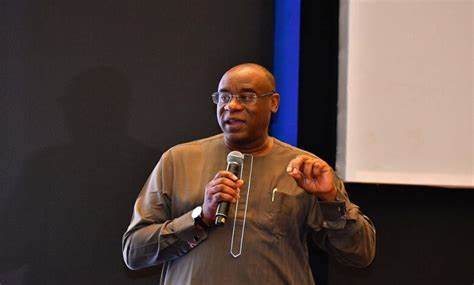The acting Governor of the Central Bank of Nigeria (CBN), Folashodun Shonubi has blamed the continuous of fall of Naira against Dollars on unofficial diaspora remittances.
Folashodun Shonubi disclosed this on Thursday, August 10, while presenting a Distinguished Personality lecture titled: “Diaspora Remittances and Nigeria Economic Development” at the National Institute for Security Studies, Abuja, for members of Executive Intelligence Management Course (EIMC) 16.
The acting Governor of the apex bank claimed that many diaspora remittances which come in Dollars are not recorded officially before moving to black or parallel markets.
Shonubi said;
“With those remittances, the dollars have come in, we know the dollars have come in but we don’t see them in the official system. So, they must be going somewhere and somewhere.
“And the challenge with the black market, unofficial market or parallel market or whatever name you want to call it, it is as a result that it is not regulated, and it becomes an easy place to have criminal activities.
“We investigate bankers, not just bankers, anybody who has committed an offence, the first thing they want to do is to run to the black markets, change it to the dollars because it is less money to carry around.
“Some of the funding in the black markets are actually from diaspora remittances. That’s why it important we need to know a lot of what’s going on there. We can’t play the sentiment game. If we don’t understand the dynamics, we usually go with the literature which does not necessarily work for us.”
Shonubi who also stated that many countries have remittances as the major source of dollars or income, added that it would be helpful if measures can be put in place to control illegal remittances and identify these channels so as to ensure remittance flows into the proper channels, and harness maximum benefits to grow the economy.
He said;
“We have countries that earn about 1.5 million dollars in remittances. Everywhere, any place you go even in developed countries such as India, China among others.
“We intend to use more of the banking system to, sending money to Sub-Saharan Africa cost highest because we don’t have masses. It would be helpful if we can work together to identify these channels because we just want the flows into the proper channels, there we can get maximum benefits to grow the economy.
“We talk about black markets, that also creates its own problems. Management of foreign exchange market and the efficacy of our policies to manage the exchange rate becomes difficult due to the insignificance of our diaspora remittances which are going to other markets.
“Today, someone called me privately that and said this thing (Naira) has gone up to some levels in the black markets, my question was, what do you want me to do? Do I operate in the black markets? I don’t know the basis of pricing in the black markets.
“The other thing people don’t realise is that, because you don’t have full information, and I will give you an example since we started I&E window. We found out that some people would deliberately wait to the last minute and do one transaction of $5,000 and that becomes the closing rate.
“We can’t do without diaspora remittances. For many countries, that’s their main source of income.”
This is coming after the Naira plunged to a record low of N910/$1 on the parallel market on Wednesday as demand for foreign currency outstripped supply.

